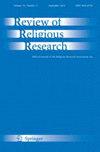Burnout Among Pastors in Relation to Congregation Member and Church Organizational Outcomes
IF 1.7
1区 哲学
0 RELIGION
引用次数: 0
Abstract
Burnout among pastors poses a threat to local church health and ministry vitality. This study examined how pastor job burnout relates to measures of church organizational health. Specifically, the current study examined the relationships between pastor job burnout and (a) intrinsic and extrinsic religiousness of worship service attenders and (b) church organizational health: financial stability and pastor turnover intentions. These relationships were studied using data from the U.S. Congregational Life Survey (USCLS) collected during 2008 to 2009. Participants were sampled across Catholic and Protestant Christian denominations, and a small proportion of participants represented other religious traditions. Analyses indicated that pastor burnout was negatively related to two measures of attenders’ extrinsic religiousness: sense of belonging and participation, but not intrinsic religiousness. Churches with higher average pastor burnout had lower ratings of financial stability. Pastor burnout was positively related to pastor turnover intentions. Social support from the congregation weakened the relationship between pastor job burnout and turnover intentions. The current study can be used to inform church leaders, members, and denominational boards. These findings demonstrate that efforts to prevent and reduce pastor burnout would benefit the entire church organization.牧师职业倦怠与会众及教会组织成果之关系
牧师的倦怠对地方教会的健康和事工的活力构成威胁。本研究探讨牧师工作倦怠与教会组织健康的关系。具体而言,本研究考察了牧师工作倦怠与(a)礼拜服务参与者的内在和外在宗教虔诚度以及(b)教会组织健康:财务稳定和牧师离职意愿之间的关系。这些关系是使用2008年至2009年收集的美国会众生活调查(USCLS)数据进行研究的。参与者来自天主教和基督教新教教派,一小部分参与者代表其他宗教传统。分析发现,牧师职业倦怠与出席者外在宗教性的归属感和参与感负相关,而与内在宗教性不相关。牧师平均精疲力竭程度较高的教会,其财务稳定性评级也较低。牧师职业倦怠与牧师离职意向正相关。来自会众的社会支持削弱了牧师工作倦怠与离职意向之间的关系。目前的研究可以用来通知教会领袖,成员,和教派理事会。这些发现表明,努力预防和减少牧师的职业倦怠将有利于整个教会组织。
本文章由计算机程序翻译,如有差异,请以英文原文为准。
求助全文
约1分钟内获得全文
求助全文
来源期刊

Review of Religious Research
Multiple-
CiteScore
2.50
自引率
20.00%
发文量
31
期刊介绍:
The Review of Religious Research (RRR) publishes empirical social science research on religion, primarily in sociology and social psychology and related fields of psychology, and scholarly literature reviews of research in these fields. RRR provides a forum for research across multiple disciplines and approaches, including research on the following topical areas: Clergy; Church programs; Comparative analyses of religious denominations and institutions; Denominational and congregational growth, decline, and vitality; Denominational and congregational conflict, competition, and cooperation; Ethnicity/race and religion; Generational and personal religious change; New religious movements; Personal spiritual and religious beliefs and practices; Religion and attitudes; Religion and family; Religion and gender, Religion and social behavior; Religion and well-being; and Research methodology. Among the characteristics that distinguish RRR from other academic journals on the study of religion are its applied focus and the opportunities it offers for academics and denomination-based researchers to share their findings with each other. RRR aims to facilitate the sharing and comparing of applied studies between denominational and academic researchers. RRR is the official quarterly journal of the Religious Research Association, Inc. RRR regularly publishes Original Articles, Research Notes, Review Articles, Applied Research Abstracts, and Book Reviews, and occasionally publishes articles on the Context of Religious Research. Applied Research Abstracts: This type of publication (previously called Denominational Research Reports) consists of a 350-550 word summary (without any references) of an applied research study in the form of a structured abstract, with the following section headings: Background, Purpose, Methods, Results, and Conclusions and Implications, followed by 3-4 keywords. The author may included a footnote that states: (a) whether a complete report exists and how it can be obtained; (b) whether the raw data are available in electronic form and how they can be obtained if the authors wish to make them available to other researchers; and (c) whether the authors would like to collaborate with other researchers to further analyze the data and write a full report for possible journal publication as a peer-reviewed manuscript. Such abstracts should be submitted to the journal editor for consideration for publication. Book Reviews: Unsolicited book reviews are not accepted for publication in RRR. If you would like to review a book for the journal, contact the Book Review Editor, David Eagle, Ph.D. – david.eagle@duke.edu Context of Religious Research: This journal heading covers items about awards and announcements, memoriams, and articles about the research process (e.g., articles on research methods and statistics, and profiles of denominational research organizations), as well as invited addresses to the Religious Research Association. Unsolicited articles should be submitted to the journal editor for consideration for publication. Original Articles: These are scholarly and methodologically sophisticated research studies: see Information for Authors on this website and the Submission Guidelines on the Springer RRR website for details (https://www.springer.com/13644) Reseach Notes: These are scholarly and methodologically sophisticated research studies: see Information for Authors on this website and the Submission Guidelines on the Springer RRR website for details (https://www.springer.com/13644) Review Articles: Authors should send an email to the journal’s editor describing the nature and scope of a proposed literature review to see if it is suitable for publication in RRR. See Information for Authors on this website and the Submission Guidelines on the Springer RRR website for details (https://www.springer.com/13644) The journal’s editor is Kevin J. Flannelly, Ph.D. – kjflannelly@gmail.com
 求助内容:
求助内容: 应助结果提醒方式:
应助结果提醒方式:


